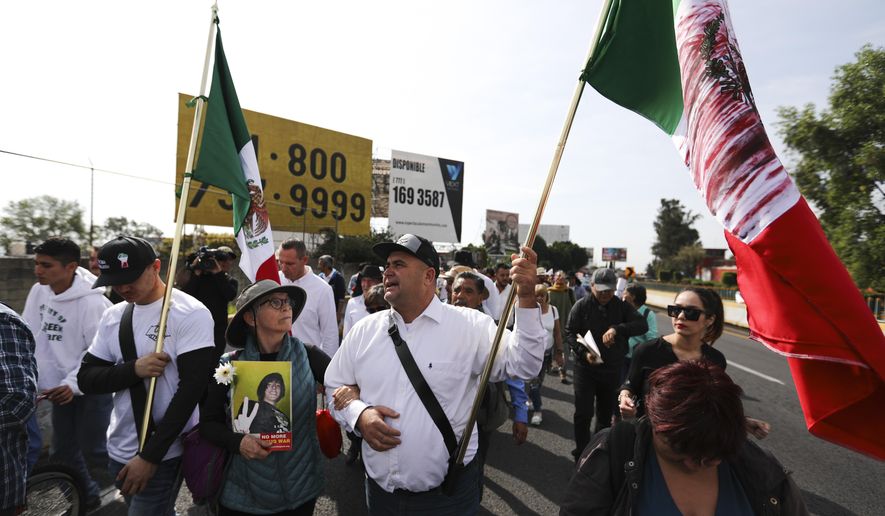MEXICO CITY (AP) - Hundreds of crime victims and their relatives began a four-day march to Mexico City Thursday to protest a wave of killings and disappearances that left 35,588 people dead in 2019.
The march is led by poet Javier Sicilia, whose son was killed in 2011. That year Sicilia led a national victim’s movement that focused on finding the country’s estimated 61,000 missing people.
This time around, relatives of nine U.S. dual-nationals killed in the northern state of Sonora in November participated in the march, which set off Thursday from the city of Cuernavaca and will reach Mexico City’s National palace on Sunday.
“Mexico is burning, its highways and byways are filled with blood and mass graves,” said Sicilia, as he led about 400 people at the start of the march. Sicilia, who is known for giving out hugs, said President Andrés Manuel López Obrador’s anti-crime policy of “hugs, not bullets” is not working.
The policy aims to avoid confrontations with drug cartels, while promising long-term social programs to reduce poverty and joblessness. The president has also proposed an amnesty for lower-level criminals.
“We want the president to understand, we are not his enemies; we are the enemies of violence,” Sicilia said. “But without truth, without justice, today an amnesty would mean impunity, forgetting, it would only lead to more hell”.
“They took them Alive, We Want Them Back Alive!” the marchers shouted, referring to missing relatives. They carried placards and banners, including a big Mexican flag painted with bullet holes.
A contingent of dual U.S. nationals came from the northern states of Chihuahua and Sonora, where nine women and children were killed on Nov. 4 by what authorities said were hit men from drug cartels.
Julian LeBaron, who lost friends and relatives in the Nov. 4 ambush, said the government has failed to protect the public, while denying citizens the right to defend themselves.
“We need to get involved, all of us, to confront the problem of violence ,”said LeBaron. “We have realized that just voting will not get us the solutions we need.”
LeBaron said members of the U.S.-Mexican community in northern Mexico have been forced to live with the domination of drug cartels for years; in 2009, his brother Benjamin was killed by cartel gunmen. LeBaron said he hoped thousands of Mexicans would join the march in Mexico City to demand better law enforcement.
“What we have here today (in the march) is an example of how to overcome fear and achieve unity,” LeBaron said.
While eager to keep the march non-political, Sicilia did condemn other policies implemented by López Obrador.
He called for putting on hold López Obrador’s project to build a train across the Yucatan peninsula until Maya communities in the region are allowed to vote on it. He also condemned the detention of hundreds of Central American migrants who tried to enter in a caravan Thursday.




Please read our comment policy before commenting.